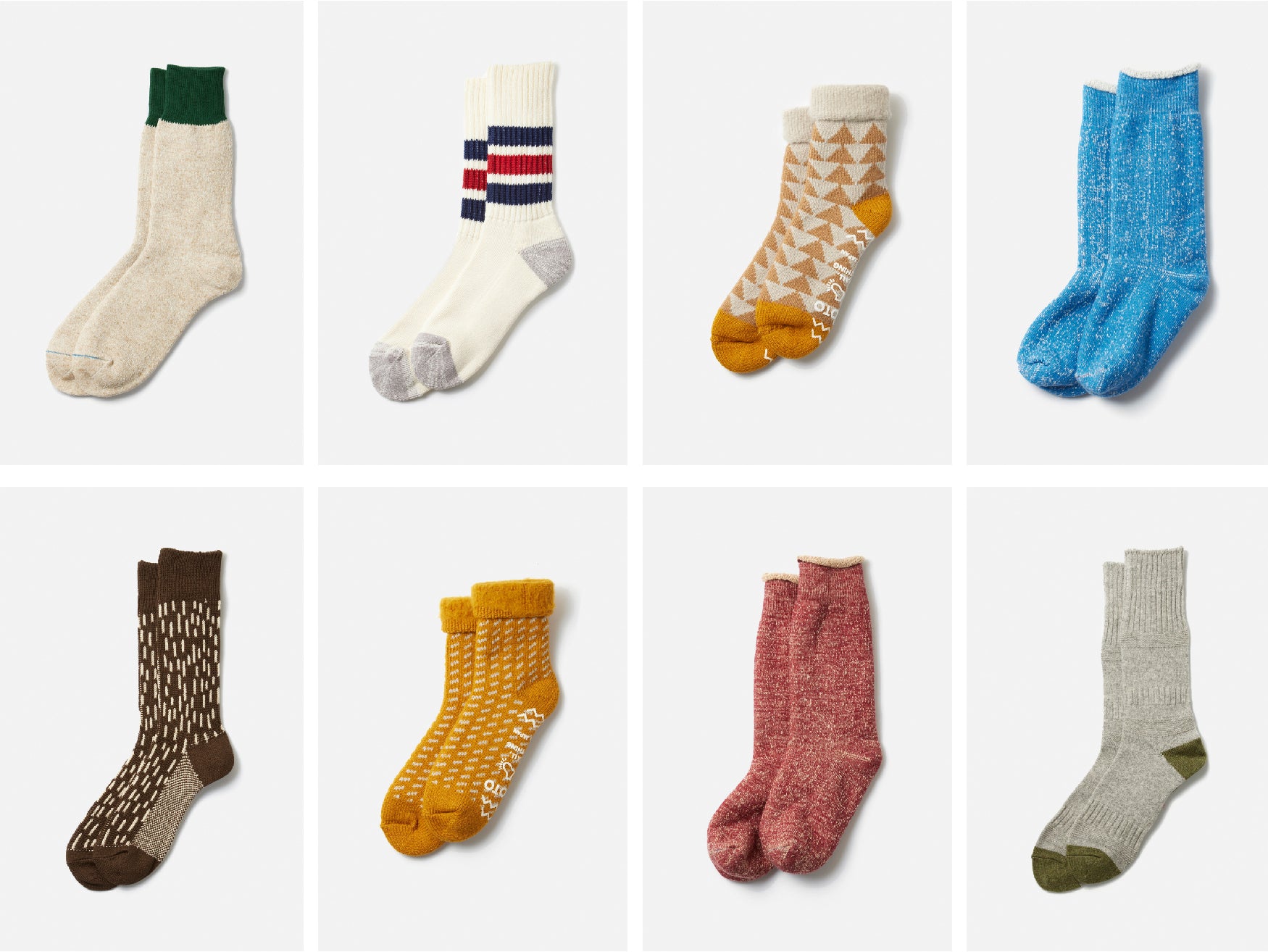Creating Bridge & Burn required a leap of faith. Founder, Erik Prowell quit his job as a software developer, lit the proverbial match, and threw it—burning the bridge of working for anyone else behind him. With no formal training he trusted his smarts and his strong work ethic, and took the plunge. In that spirit, Bridge Burners is a series showcasing people who are taking a similar leap.
“Sausage really is a perfectly designed meat,” claims Clinton McDougall, while his business partner Dane Brown nods in pseudo-solemn agreement.
Collectively they have surely said this hundreds of times, but you can tell they still get a chuckle out of it. Together they run Bestie—a friendly little sausage and beer parlour in Vancouver, BC, specializing in Germany’s favorite street food: currywurst. Their tiny Chinatown shop is the darling of the Vancouver foodie circuit.

Dane is in our Depoe Navy Donegal button up & Clinton is wearing a sold out Spring 14 button up. Photos by Rachel Pick.
Dane and Clinton didn’t initially set out to be slingers of sausage and sauerkraut but they both knew early on they wouldn’t follow predictable career paths. “I remember taking a calculus exam and thinking, ‘Why am I doing this? I don’t like this at all, I just feel like it’s something I should be doing.’ The older I get the more I realize it doesn’t matter what people expect you to do,” says Dane. “When I was four or five years old my mom told me, ‘If you grow up and want to dig ditches for a living, that’s okay.’”
He hasn’t yet dug ditches, but he’s done a few of other things—studied art and entertainment management, ran a cooperative workspace. Ultimately he thought he’d end up in the music industry but he also had a deep interest in industrial design, which seemed worth exploring.
Clinton, meanwhile, studied sculptural art—earning a BFA which he parlayed into various pursuits: architectural millwork, antique refinishing, custom furniture design. He always kept a restaurant job on the side, “just to be around people, food and drink.” He also had a persistent interest in industrial design.
Both wanting to dabble before committing to further education, they each independently applied to Vancouver design house Molo—best known for their pliable, expanding, paper room dividers. The met when they got hired on the same day.

Clinton moved into a sales role, while Dane was involved in marketing and social media. They began traveling together for work—three weeks in Europe for Milan’s design week, and various trips around the US.
“You’re working really long days, then you’re eating and drinking together,” explains Clinton. “Not only did we develop a professional relationship but a personal one—after 10 days of working together we’d still go out and explore together. So, we knew we could work together in demanding situations.”
On one such a trip to LA they stumbled upon a currywurst shop in Silverlake opened by a recently emigrated Berlin couple. That was the seed for Bestie. Back in Vancouver the idea took root.
“In the studio where we worked there were a lot of young creatives, so there were always these million-dollar ideas batted around… well, maybe $100,000 ideas,” says Clinton. It was a perfect incubator for aspiring entrepreneurs.
“All throughout my life I’ve known I wanted to run my own business. I have books and books of ideas, but never anything that felt 100 percent,” says Dane. This currywurst idea, however, felt like the one. The timing was right and all the pieces were in place.


“There’s this whole rise in street food and craft butchery—and like Portland, Vancouver’s such a food city,” says Clinton. “Plus, we liked that idea of doing one thing and doing it well.” And, as the guys like to say: “We live in a sausage-deprived society!” It’s become a buzzline for the Bestie owners, but it’s also true says Clinton: “Look at European, South African or South American cultures—there’s so much more sausage.”
Ultimately, Dane says they knew: “If we don’t do this, someone else will. Probably a year or two down the road, and they’re not going to do as cool a job as we would.”
And so they did. They dove headlong into the project. Planning details right down to the custom engraved three-pronged pommesgabels.
Signing the lease on their Chinatown storefront, however, made it real. “That was scary,” says Dane. “I would have sleepless nights wondering if we were doing the right thing. We dragged our feet, but eventually we just had to sign this legally binding agreement. Whatever happened we’d need to find some way to make money with this space. Our plumber was a cool guy who let us do things like carry in pipes to save money. He would say, ‘Boys if this sausage thing doesn’t work out you can come work for me.’ That was our running joke: if it doesn’t work we can become plumbers, pay off the debt and do something else.” Considering they did nearly every aspect of the build-out (they owe a huge debt to Youtube tutorials) there’s any number of jobs they now could do.

Leading up to the opening, Clinton left Molo and took their business plan through a ten-week entrepreneurial program at a local university. Dane continued part time work, and was sure to enlist the help of their talented coworkers: “I think nearly everyone who worked at Molo did something—the ceramic lights, the stools, the website, the drywall, the peg wall.”
When Bestie finally opened in 2013, Vancouver promptly lost their kraut over currywurst, clamoring to get their lips on that sausage. Things haven’t slowed down since. A year and a half later, the novelty of eating currywurst every day has worn off for Clinton and Dane, but the novelty of owning a business and being their own boss definitely has not.
“Through Bestie we’re able to exercise our values—working with food and beer, meeting interesting people, connecting with our design community and the art community. We’ve commissioned artists we know to make work, and we can pay them like they should be payed,” explains Clinton.
Above all, now that they are no longer working 70-hour weeks, they have the freedom to indulge in all their varied interests—a condition that’s actually written right into their business plan.
“We both have other creative interests and we knew Bestie wasn’t going to be the only thing we do for the next 50 years. The goal was always to work really hard and then bring smart people on board to help us,” says Dane. That, they’ve done. For Dane that means keeping up ties to the music industry including using the Bestie space for Sunday record sales. For Clinton it means indulging in his passion for food and drink, and design and packaging through projects like custom condiments.

But the best part?
“Making the schedule!” says Clinton, “because we get to decide. Our first public holiday came along and we asked ourselves ‘Are we open public holidays?’ And we thought, would we want to work on a public holiday? Great, we’re not open public holidays.”
“It’s everything from deciding we’re not using paper towels because the wind machine works great, to deciding to rent a sailboat for our staff party. We get to make decisions and do things how we want to do them.” So far that means doing everything right, judging by the faithful horde of diners filling Bestie’s bespoke booths every night… except Sunday, because they’re the bosses, and they don’t wanna.






